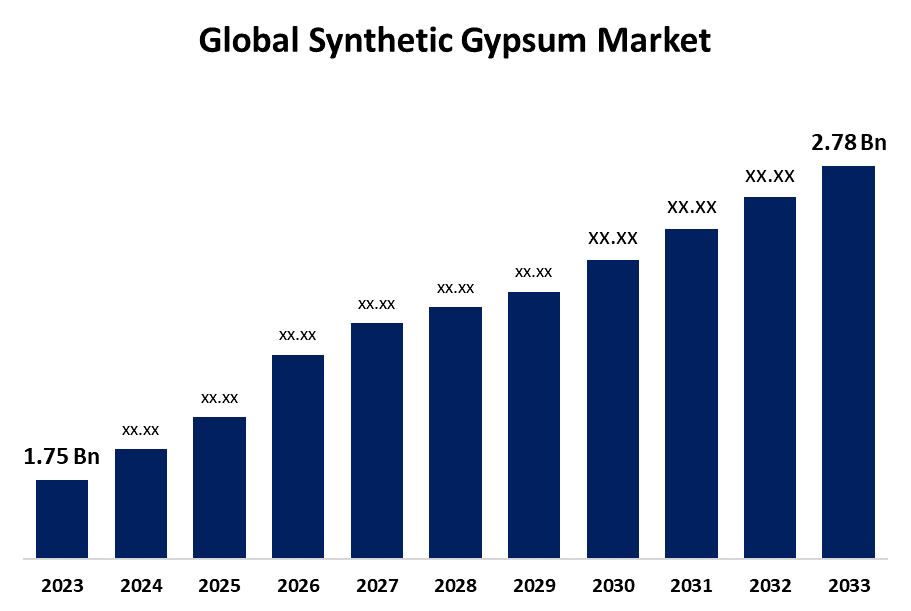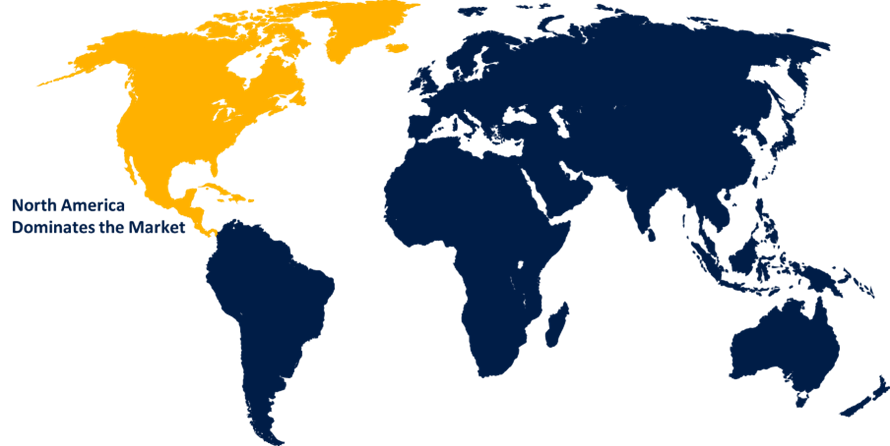Global Synthetic Gypsum Market Size, Share, and COVID-19 Impact Analysis, By Product (Flue Gas Desulfurization (FGD) Gypsum, Fluorogypsum, Phosphogypsum, Citrogypsum, and Others), By Application (Drywall, Cement, Soil Amendments, and Others), and By Region (North America, Europe, Asia-Pacific, Latin America, Middle East, and Africa), Analysis and Forecast 2023 - 2033
Industry: Advanced MaterialsGlobal Synthetic Gypsum Market Insights Forecasts to 2033
- The Global Synthetic Gypsum Market Size was Valued at USD 1.75 Billion in 2023
- The Market Size is Growing at a CAGR of 4.74% from 2023 to 2033
- The Worldwide Synthetic Gypsum Market Size is Expected to Reach USD 2.78 Billion by 2033
- Europe is Expected to Grow the fastest during the forecast period.

Get more details on this report -
The Synthetic Gypsum Market Size is Anticipated to Exceed USD 2.78 Billion by 2033, Growing at a CAGR of 4.74% from 2023 to 2033.
Market Overview
Synthetic gypsum is a man-made variant of the soft sulfate mineral gypsum obtained primarily for flue-gas desulfurization at some coal-fired power plants. Synthetic gypsum can be used interchangeably with natural gypsum in various applications, including fertilizer, as the primary component in multiple types of plaster, blackboard/sidewalk chalk, drywall, and ornamental uses. It can be used to make molds for dinnerware and dental impressions and to build roads and highways. This low-cost, simple chemical is found in many of houses, food and hygiene products, cosmetics, and even medical applications. Synthetic gypsum materials are by products of industrial processes such as flue gas desulfurization and scrubbing in fossil-fueled power plants. Synthetic gypsum comprises hydrated calcium sulfate and has similar qualities to natural gypsum. It is made from waste generated in a fossil-fueled power plant, making it cost-effective and having no negative environmental impact. Gypsum is used as a cement retarder to control the setting time of cement and prevent it from setting rapidly enough. Because it has the same properties and chemical makeup as natural gypsum, synthetic gypsum is an excellent alternative in the cement industry. In addition, the development of novel methods of synthetic gypsum is driving the increase in market revenue growth.
Report Coverage
This research report categorizes the market for the synthetic gypsum market based on various segments and regions forecasts revenue growth and analyzes trends in each submarket. The report analyses the key growth drivers, opportunities, and challenges influencing the synthetic gypsum market. Recent market developments and competitive strategies such as expansion, product launch, and development, partnership, merger, and acquisition have been included to draw the competitive landscape in the market. The report strategically identifies and profiles the key market players and analyses their core competencies in each sub-segment of the synthetic gypsum market.
Global Synthetic Gypsum Market Report Coverage
| Report Coverage | Details |
|---|---|
| Base Year: | 2023 |
| Market Size in 2023: | USD 1.75 Billion |
| Forecast Period: | 2023-2033 |
| Forecast Period CAGR 2023-2033 : | 4.74% |
| 2033 Value Projection: | USD 2.78 Billion |
| Historical Data for: | 2019-2022 |
| No. of Pages: | 198 |
| Tables, Charts & Figures: | 110 |
| Segments covered: | By Product, By Application, By Region |
| Companies covered:: | USG Corporation, Knauf Gips KG, American Gypsum Company, LLC., BauMineral, Travancore Titanium Products Limited, Constantia Building Products, National Gypsum Company, Delta Gypsum, Winstone Wallboards Limited, Yoshino Gypsum Co., Ltd., Transparent Tehcnologies Limited, Boral Limited, Saint-Gobain S.A, Synthetic Materials LLC, and Others |
| Pitfalls & Challenges: | Covid-19 Empact, Challenges, Growth, Analysis. |
Get more details on this report -
Driving Factors
Rapid urbanization in developing nations is increasing demand for construction materials, particularly synthetic gypsum. As more people relocate to cities, there is an increased demand for new housing, infrastructure, and commercial structures. The use of synthetic gypsum in agricultural applications has helped to prevent soil erosion and nutrient leaching, resulting in higher crop yields and lower environmental impacts. Agricultural investments and R&D by various industry participants will also drive growth in the market.
Restraining Factors
The quality and uniformity of synthetic gypsum vary depending on its source and manufacturing technique. Manufacturers and end-users may be concerned about its purity and performance as compared to natural gypsum.
Market Segmentation
The synthetic gypsum market share is classified into product and application.
- The flue gas desulfurization (FGD) segment dominates the market with the highest market share through the forecast period.
Based on the product, the synthetic gypsum market is categorized into flue gas desulfurization (FGD) gypsum, fluorogypsum, phosphogypsum, citrogypsum, and others. Among these, the flue gas desulfurization (FGD) segment dominates the market with the highest market share through the forecast period. FGD gypsum, produced by flue gas desulfurization systems in power plants, is one of the more prevalent forms due to its availability and purity. As environmental restrictions increase, the demand for FGD gypsum as a sustainable alternative to natural gypsum in the construction and manufacturing industries is set to increase considerably.
- The drywall segment holds the highest market share through the forecast period.
Based on the application, the synthetic gypsum market is categorized into drywall, cement, soil amendments, and others. Among these, the drywall segment holds the highest market share through the forecast period. Drywall manufacturing relies significantly on synthetic gypsum for its lightweight, fire-resistant, and mold-resistant qualities, catering to the construction industry's desire for high-quality building materials. Rising building activity worldwide, driven by growing urbanization in the developing world, is driving demand for drywall, resulting in market expansion.
Regional Segment Analysis of the Synthetic Gypsum Market
- North America (U.S., Canada, Mexico)
- Europe (Germany, France, U.K., Italy, Spain, Rest of Europe)
- Asia-Pacific (China, Japan, India, Rest of APAC)
- South America (Brazil and the Rest of South America)
- The Middle East and Africa (UAE, South Africa, Rest of MEA)
North America is anticipated to hold the largest share of the synthetic gypsum market over the forecast period.

Get more details on this report -
North America is projected to hold the largest share of the synthetic gypsum market over the forecast period. North America has been a major consumer and producer of synthetic gypsum due to strict environmental restrictions and a well-established construction industry. The region's dedication to sustainable construction practices fuels the demand for synthetic gypsum. Due to the growing demand for research into synthetic gypsum manufacture. North American governments have implemented in place supportive laws and legislation to encourage the use of synthetic gypsum as a more sustainable alternative to natural gypsum. These initiatives encourage research and development (R&D) in synthetic gypsum technology, further encouraging its use.
Europe is expected to grow at the fastest CAGR growth in the synthetic gypsum market during the forecast period. Due to the growing building sector, strict environmental restrictions, and rising demand for sustainable gypsum. The European construction sector is distinguished by a strong emphasis on rehabilitation and refurbishment activities, particularly in older buildings. There is a high demand for synthetic gypsum as a cost-effective and adaptable material for interior wall and ceiling applications. The European Union (EU) member states have enacted severe environmental laws aimed at lowering the environmental impact of the building industry. Synthetic gypsum is a sustainable alternative to natural gypsum because it is made from waste materials from industrial processes, eliminating the need to extract natural gypsum.
Competitive Analysis:
The report offers the appropriate analysis of the key organizations/companies involved within the synthetic gypsum market along with a comparative evaluation primarily based on their product offering, business overviews, geographic presence, enterprise strategies, segment market share, and SWOT analysis. The report also provides an elaborative analysis focusing on the current news and developments of the companies, which includes product development, innovations, joint ventures, partnerships, mergers & acquisitions, strategic alliances, and others. This allows for the evaluation of the overall competition within the market.
List of Key Companies
- USG Corporation
- Knauf Gips KG
- American Gypsum Company, LLC.
- BauMineral
- Travancore Titanium Products Limited
- Constantia Building Products
- National Gypsum Company
- Delta Gypsum
- Winstone Wallboards Limited
- Yoshino Gypsum Co., Ltd.
- Transparent Tehcnologies Limited
- Boral Limited
- Saint-Gobain S.A
- Synthetic Materials LLC
- Others
Key Target Audience
- Market Players
- Investors
- End-users
- Government Authorities
- Consulting And Research Firm
- Venture capitalists
- Value-Added Resellers (VARs)
Recent Developments
- In October 2023, Valmet acquired an order to design and deliver FGD gypsum for use in an Indian petroleum refinery. The product is intended to assist purchases to reduce sulfur oxide emissions, resulting in lesser air pollution.
- In October 2023, Etex announced a contract to buy BGC's gypsum and fiber cement operations. This acquisition includes BGC's wallboard, plaster, compound, and cornice production facilities, along with the Perth gypsum wallboard factory in Western Australia.
Market Segment
This study forecasts revenue at global, regional, and country levels from 2020 to 2033. Spherical Insights has segmented the synthetic gypsum market based on the below-mentioned segments:
Global Synthetic Gypsum Market, By Product
- Flue Gas Desulfurization (FGD) Gypsum
- Fluorogypsum
- Phosphogypsum
- Citrogypsum
- Others
Global Synthetic Gypsum Market, By Application
- Drywall
- Cement
- Soil Amendments
- Others
Global Synthetic Gypsum Market, By Regional Analysis
- North America
- US
- Canada
- Mexico
- Europe
- Germany
- UK
- France
- Italy
- Spain
- Russia
- Rest of Europe
- Asia Pacific
- China
- Japan
- India
- South Korea
- Australia
- Rest of Asia Pacific
- South America
- Brazil
- Argentina
- Rest of South America
- Middle East & Africa
- UAE
- Saudi Arabia
- Qatar
- South Africa
- Rest of the Middle East & Africa
Frequently Asked Questions (FAQ)
-
1. What is the CAGR of the global synthetic gypsum market?The global synthetic gypsum market is projected to expand at 4.74% during the forecast period.
-
2. Who are the top key players in the global synthetic gypsum market?The key players in the global synthetic gypsum market are USG Corporation, Knauf Gips KG, American Gypsum Company, LLC, BauMineral, Travancore Titanium Products Limited, Constantia Building Products, National Gypsum Company, Delta Gypsum, Winstone Wallboards Limited, Yoshino Gypsum Co., Ltd., Transparent Tehcnologies Limited, Boral Limited, Saint-Gobain S.A, and Synthetic Materials LLC.
-
3. Which region is expected to hold the largest share of the global synthetic gypsum market?The North America region is expected to hold the largest share of the global synthetic gypsum market.
Need help to buy this report?